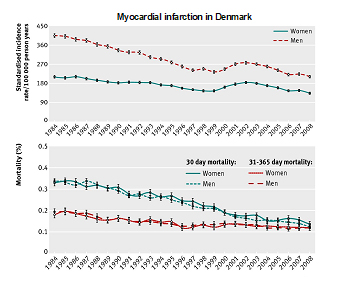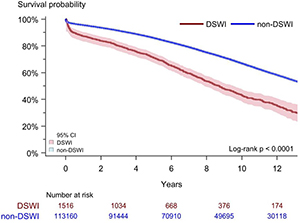Populations
Groups and environments within the network that perform research in causes and outcomes of cardiovascular diseases in groups of people and on community level.
If you would like your research group featured here, please contact Jacob Fog Bentzon.
Cardiovascular epidemiology

Cardiovascular epidemiology is the study of the causes and prevention of cardiovascular diseases. We integrate knowledge on all aspects of cardiovascular disease, including physiology, life style, socio-economy, laboratory data, treatment, risk factors, and prognosis. Major focus areas include the study of trends in the incidence and prognosis of acute and chronic cardiovascular diseases, risk and prognostic factors, medication use and interactions, and comparisons of cardiovascular interventions, such as coronary stents, in pragmatic trials.
Key research methods
- Population-based studies using Danish medical registries
- Emulated trial designs (applying trial criteria to observational data)
- Questionnaires
Contact Morten Schmidt for more information
Diet, Lifestyle & Genetics in Health and Disease

The food we eat constitutes the body’s building blocks. Each Dane consumes an average of 3 kilogrammes of food and fluids daily, which amounts to a ton a year. We study associations between diet, lifestyle and health as well as morbidity. For instance, how will the risk of disease change if you switch from eating a lot of meat to eating many vegetables? Our diet is a part of our overall lifestyle, and the importance of diet and lifestyle also partially depends on genetics. Thus, many studies examine the interaction between diet, lifestyle, genetics and morbidity as well as mortality.
Key research methods
- Epidemiologic study design
- Regression models
Contact Christina Dahm for more information.
The Registry Study Group of Cardiothoracic and Vascular Surgery

In the research unit Cardiothoracic and Vascular Surgery we use large amount of data from national and international registries to investigate causes, risk factors, short- and long-term clinical outcomes of diseases and complications to cardiac and vascular surgery, catheter-based procedures, diagnostics, or interventions in relation to cardiac or vascular procedures. A vast amount of information on demographics and pre-, peri-, and postoperative factors of patients are collected prospectively and can be used to study exposures and long-term outcomes in patients undergoing cardiothoracic or vascular surgery.
- Discover our research at www.ctvs.au.dk.
Key research methods
- Large national and international registries with information on patients referred to cardiothoracic or vascular surgery or interventions.
- Modern epidemiological principles, including identification of possible confounders and effect modifiers.
- Updated biostatistical methods and programming in close cooperation with The Biostatistical Advisory Service (BIAS) at Aarhus University.
Contact Associate Professor, Consultant Ivy Susanne Modrau (German) or Affiliated Researcher Alexander Emil Kaspersen for more information
Why don’t we all get coronary artery disease
Despite a high load of traditional risk factors some people never develop coronary artery disease (CAD). Such resilient individuals may have a particular genetic profile, protecting them from disease. We are searching for rare mutations, which are protecting the carrier from CAD even in the presence of high LDL cholesterol levels. Such individuals are normally hard to find, as they are typically not enrolled in any clinical trials. We analyse whole genome sequences from the Dan NICAD cohort, comprising individuals with chest-pain undergoing coronary CT scans, as well as sequences from the UK Biobank. Focus is on genes expressed in smooth muscle cells. Overall goal is to identify drugs that can mimic the mutations, we all want.
Contact Mette Nyegaard for more information